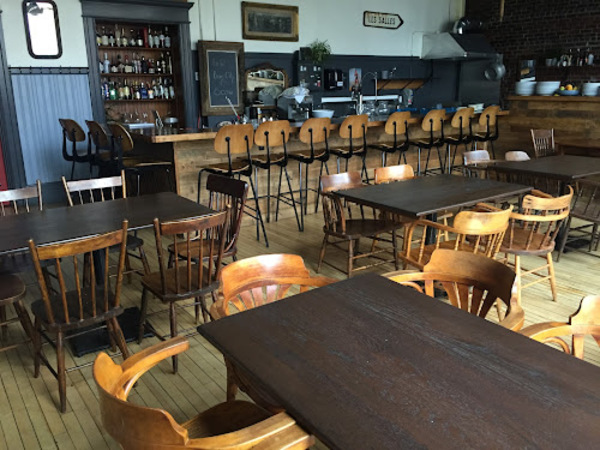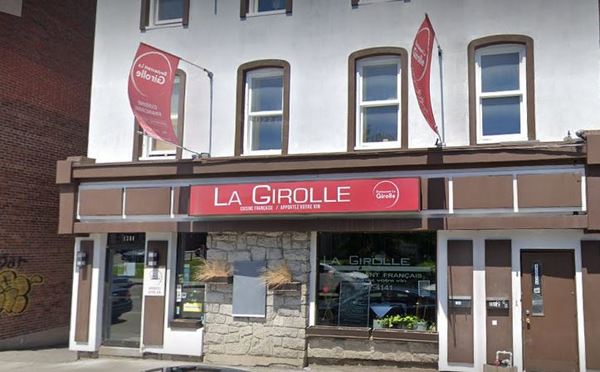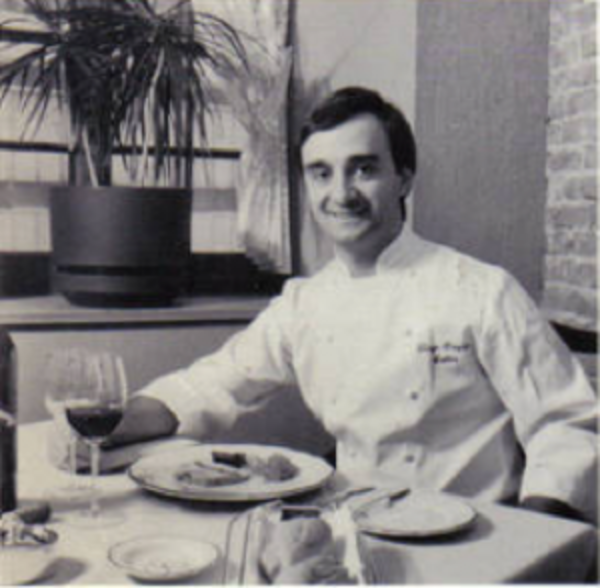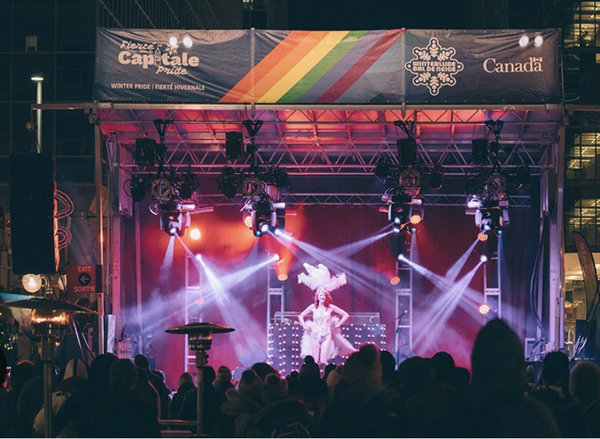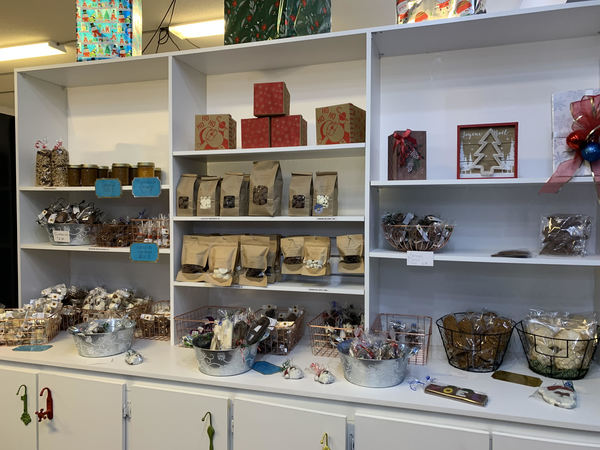On the heights of Campbellton, near the Restigouche River, stands a grand manor over a hundred years old that Philippe Lévesque acquired, renovated, and lovingly furnished with good taste over the past seven years, a true passion project. But what will first delight
travelers who visit is the lush and vast garden that surrounds the property.
The owner's background in botany is evident in the profusion of flowers and plants of all kinds that can be admired from May to October. Not to mention the large number of green plants and other types of greenery that occupy various spaces inside.
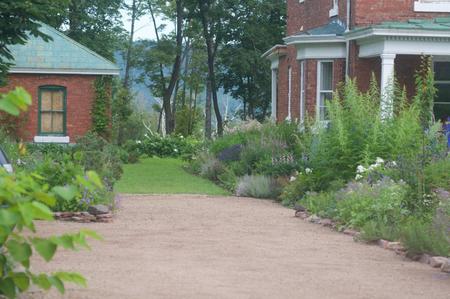
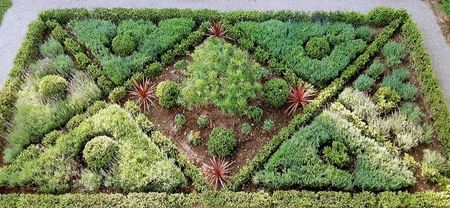
On its three floors, rooms and suites filled with antique or vintage furniture make this cottage a place where history and regional traditions have converged since 2022, all year round. This lover of vegetation and nature cultivates the art of warm hospitality as much as that of the plants in the vast garden.
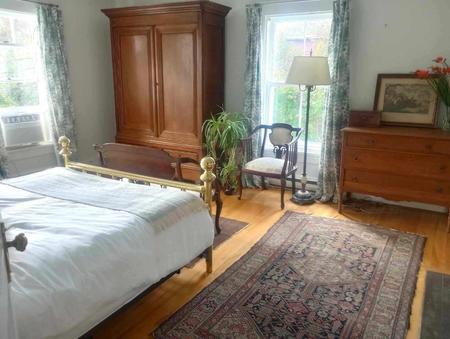
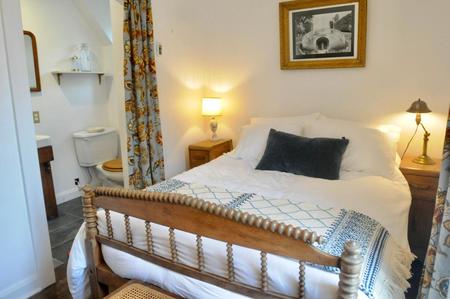
According to some comments read on the booking site, the quality of the stay at Maison Napier is noteworthy. “The architecture and associated furniture, Napier House has retained its charm! Philippe's welcome is very warm, the breakfast just perfect, with silverware and homemade jams,” can be read among the mentions.
From the entrance, you can smell something baking in the oven, which adds to the pleasure of the stay. Breakfasts are always a precious moment of the day.
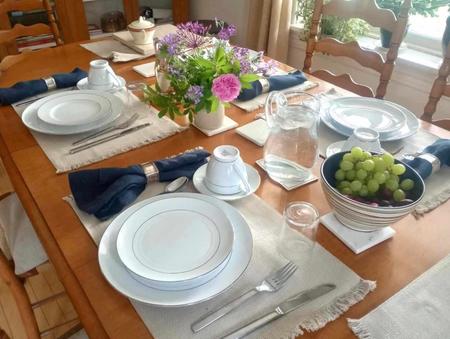
Maison Napier offers 4 bedrooms and a two-bedroom apartment for rent daily or weekly. The house's decor is in keeping with its architectural style and age, but it offers all the comforts of modern life.
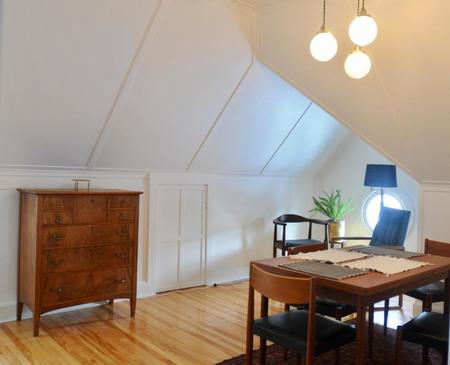
Its host and owner continues his work of landscaping and renovating the residence which once hosted a senior American executive of a manufacturing company who stayed there with his family during his tenure with the Campbellton company.
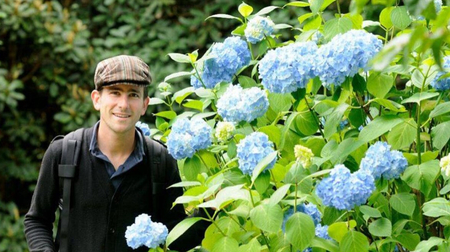
Worth noting, the place is only a few steps from the Interprovincial Bridge that connects Listuguj and Pointe-à-la-Croix at the start of the Baie des Chaleurs in Quebec, and the Restigouche region on the New Brunswick side.
Maison Napier
5 Stanley Street
Campbellton, NB
506-760-1945
phili664.wixsite.com/maison-napier
Crossing the Matapedia Valley, one reaches the Restigouche River, into which the Matapedia flows. The Restigouche empties into the Chaleur Bay in the heart of the Appalachians. It is a river globally renowned as a salmon river and part of Canadian heritage. The name Restigouche comes from the Anglicization of Listuguj, the name of the Mi'gmaq community that camped along its banks hundreds of years before the arrival of the first French colonizers. Even today, the community of Listuguj, one of the most significant Mi'gmaq communities in the Maritimes, stands on the Quebec side opposite the town of Campbellton in New Brunswick.

On the right bank of the Restigouche, the newly merged town of Campbellton forms, along with the communities of Listuguj and Pointe-à-la-Croix connected by the interprovincial bridge, the most significant conurbation in the Chaleur Bay with its some 15,000 inhabitants.
The Mi'kmaq called the site Wisiamkik, meaning muddy place, referring to the sediments in the narrows of the Restigouche. The site was named Pointe-des-Sauvages around 1700 during the French colonial era, and a small village was founded there by deported Acadians in 1755, while more than 1,000 deportees settled across in Petite-Rochelle. This significant village only had a brief existence as it was razed under the orders of James Wolfe after the fall of New France in 1760. The site became a mere trading post for decades as the Acadians dispersed and founded various villages around Chaleur Bay. The town truly emerged with Scottish immigration to the region in the early 19th century. The town originally bore various names. The current name was given in 1833 in honor of Sir Archibald Campbell, Lieutenant-Governor of New Brunswick from 1831 to 1837.
When you reach the end of the road leading to the tip of the peninsula and spot the vast seaside estate featuring a 24-room hotel including an aesthetic care center (spa), a convention center, and 33 chalets available for rent scattered about, one realizes the scale of the welcoming place.
The site impresses with its magnitude, its streets marked like those in a village, its tranquility, and the sense of well-being it exudes, thanks to a uniquely designed layout. A stay will convince even the hardest to please. The hotel offers all the amenities one might expect from such a location. Breakfast is included and served in a room with a full sea view, but no other meals are provided during the day. Several dining options are available a short distance away in the town of Tracadie.
Villégiature Deux Rivières truly provides hotel service worthy of major hotel chains, but without the associated constraints. Martin Albert, a native son with an MBA in Business Administration from the Université de Moncton, has been the general manager since 2013. Albert was previously the general manager of the municipality of Paquetteville.
“What sets Villégiature Deux Rivières apart from chain hotels is that everything is decided and managed locally,” explains its general manager.
 Martin Albert is proud to have been part of this wonderful adventure for nearly 10 years. For him, the mission and vision of Villégiature Deux Rivières are part of his everyday life. Although the place has already become a staple for quality accommodation and stays in recent years, he aims to make it “the preferred destination in Atlantic Canada, where guests can capture unforgettable Acadian-flavored memories.”
Martin Albert is proud to have been part of this wonderful adventure for nearly 10 years. For him, the mission and vision of Villégiature Deux Rivières are part of his everyday life. Although the place has already become a staple for quality accommodation and stays in recent years, he aims to make it “the preferred destination in Atlantic Canada, where guests can capture unforgettable Acadian-flavored memories.”
The introduction of a bike path in the area has attracted a new clientele for whom the environmental tranquility of the place, with the omnipresence of the sea and breathtaking sunrises, are key attractions. In winter, the snowmobile trails also bring many visitors.
A story that began almost 25 years ago.
It was in 1999 that the adventure of the Deux Rivières Resort Center began in Tracadie-Sheila. The municipality had entrusted the Two Rivers of Tracadie Development Corporation (CDDRT) with developing this exceptional site.
From then on, thanks to a public-private partnership agreement between a group of local investors and the CDDRT, construction of 33 chalets began. The following year, the convention center was built. In 2001, 17 new chalets were added. Then in 2009, a 20-room hotel was built. Just in time for the World Acadian Congress.
In 2012, the company underwent a name change to become Villégiature Deux Rivières, better reflecting the services offered by the business. In 2013, the Two Rivers Development Corporation of the municipality withdrew from the resort center, which is now fully managed by this corporation of owner investors.
The company wanted to grow and have enough accommodations to host medium-sized conventions on the site. The chalet investors then became shareholders of the hotel with the registration of a Deux Rivières Hotel corporation to oversee its management.
Villégiature Deux Rivières
www.deuxrivieres.ca
100, rue Deux Rivières
Tracadie-Sheila, N.B.
506.394.4050
Located in downtown Moncton, the Aberdeen Cultural Centre is a historic building that houses several cultural organizations and artists' studios, serving as an important gathering place for the artistic community in southeastern New Brunswick.
It is also the location of the restaurant Les Brumes du Coude, which opened in 2014 with chef Michel Savoie at the helm. The bistro quickly made its mark among the top 100 restaurants in Canada. It offers simple and tasty cuisine—a true French bistro cuisine, a result of his seven years of cooking in France.
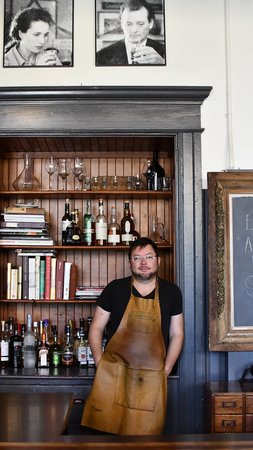
The restaurant is housed in a former classroom of the Aberdeen School, which became the Aberdeen Cultural Centre in 1986. In 2017, the centre added a 50-seat cultural terrace, managed by Les Brumes du Coude during the summer season.
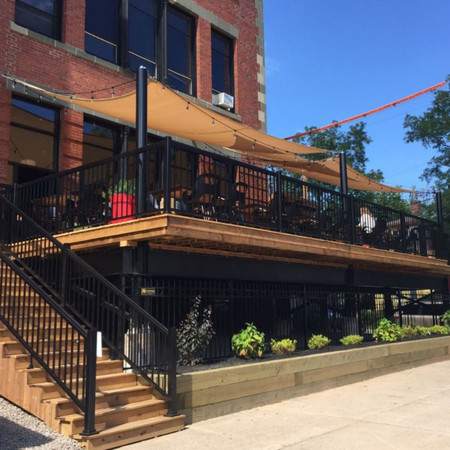
So, where does the name of his restaurant come from? The city of Moncton is known for its Petitcodiac River, whose name means "which bends like a bow" in Mi'kmaq. The Acadians who settled there in 1733 called this place Le Coude because of the bend in this powerful brown river, where the mists from the marshes hide. To this day, Moncton is still nicknamed Le Coude.
However, the name Les Brumes du Coude has a very different meaning for the owner-chef Michel Savoie. He explains this term as being a description of what inspires him in cooking: the misty smells of simmered dishes, the vapors that are the result of physical effort, or elbow grease.
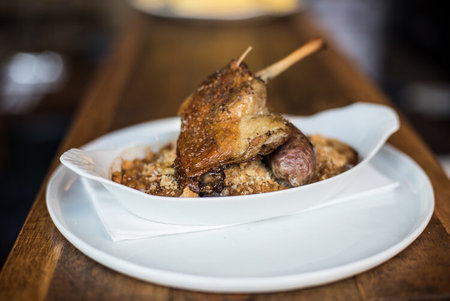
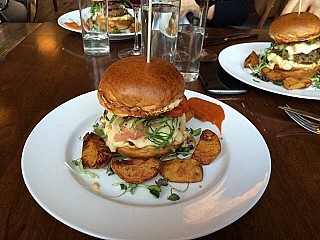
His cuisine is generous, fair, and on point, in the spirit of a French bistro. Inspired by seasonal local and sea products, it features a blend of French, Acadian, and other culinary traditions. "There is always something new to discover at Les Brumes du Coude because, just like the menu, the wine and cocktail list is constantly evolving. The team at Les Brumes du Coude will be pleased to welcome you to this lively, warm, and friendly space," he explains.
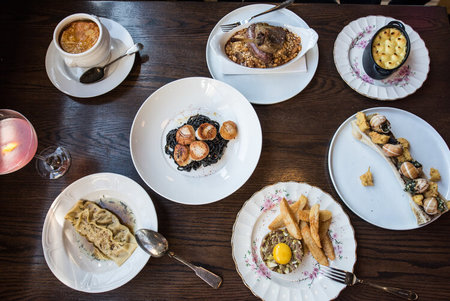
Originally from Tabusintac, a small village north of Néguac, Michel Savoie was not destined for the restaurant business. Before the end of his high school studies, he had not really shown an interest in cooking. Financial reasons did not allow him to attend university. At 18, with no particular qualifications, he found himself working in a kitchen, starting as a dishwasher. Gradually, he discovered a certain talent in the pots and pans.
He has been in the restaurant industry for about twenty years, mainly in Montreal and Tours, France, often holding positions at the lower end of the hierarchy. His move to France was because he followed his then-wife, who was French. Did he receive formal culinary training? He spent a few months at the ITHQ in his early twenties but was unable to complete the training due to financial constraints.
His desire to combat pervasive junk food, even in Moncton, motivated him to move forward with opening his own restaurant.
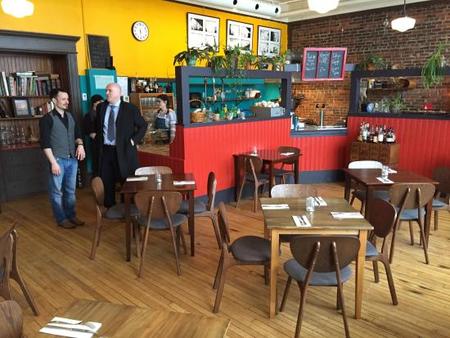
Could he be contributing to the reinvention of Acadian cuisine with his attempts to revalue local products? He would rather cook as much as possible with local and sea products from here. One might call it Acadian cuisine if the terroir in question corresponded to an Acadian territory. However, he prefers not to get involved in the thorny debate over the borders of Acadia.
In the meantime, we have the leisure and privilege of enjoying the place, its charming decor, its enticing menu, and the beautiful culinary discoveries that Michel Savoie shares with his clientele. And if you are a fan of mussels, know that the best of the kind have been savored here, in proportions to satisfy the greatest appetites.
Les Brumes du Coude
lesbrumesducoude.com
140 Botsford Street
Moncton, NB E1C 4X5
506 858-0777
Aficionados are well-aware that Cantharellus cibarius, known in French as girolle or Chanterelle commune, is a species of basidiomycete fungi belonging to the Cantharellaceae family. This mushroom, widespread across the Northern Hemisphere, is esteemed for its culinary excellence, ranking among the most renowned and sought-after in its category.
By analogy, the same can be said for the French "bring your own wine" restaurant La Girolle, nestled in Quebec's Saint-Sacrement neighborhood, which has been a well-known and sought-after destination for 23 years. Owned by Chef David Grenier (photo) since 2018, the establishment has preserved the spirit and values of its founders while naturally evolving its menu over the years and seasons.
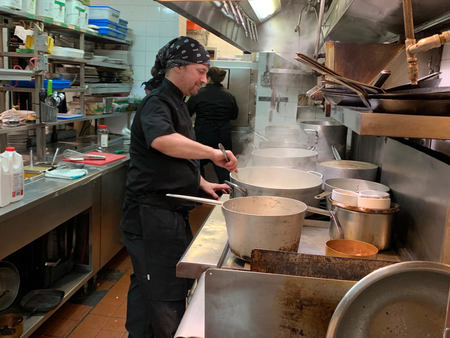
Let's highlight some of the famous dishes available. Starters include: Deluxe Charcuterie Plate, Escargot Pastry in Cheese Sauce, Flavors of L'ile d'Orléans, Bison Carpaccio with Truffle Emulsion. Main courses particularly appreciated are: Scallop and Shrimp Risotto, Grilled Lamb Loin with Spanish Sauce, Duck Breast with Port and Serviceberry, Braised Sweetbreads à la Forestière, Land and Sea / Black Pudding with Spices, Deer in Mushroom Crust with Périgord Sauce, Salmon Pavé with Mango Salsa, Chef's Style Beef Fillet Mignon, Pork Tenderloin with Cheddar Fondue and Balsamic.
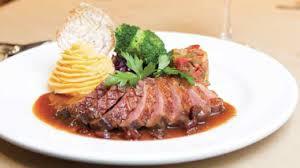
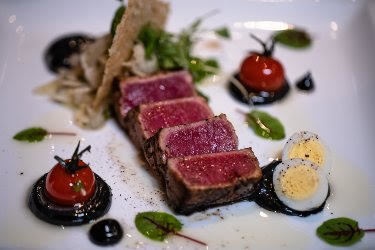
Grenier, before acquiring the restaurant, had been actively involved in various kitchen roles, from dishwasher to cook, starting at the age of 18. Despite not attending prestigious culinary schools or holding renowned degrees in hospitality, his merit includes stints at famed establishments during travels in Australia and around the world, where he honed and developed his culinary skills.
Alongside the previous owners of La Girolle, he has cultivated the art of dining based on dishes that continue to contribute to the place's fame and draw a loyal clientele, in addition to developing an entirely new menu. Since Grenier took over, there have been no major changes to the venue: the carpet was removed, and some minor renovations were made. His motivation lies in maintaining consistent quality in the cuisine, always in line with market availability and seasonally affordable products.
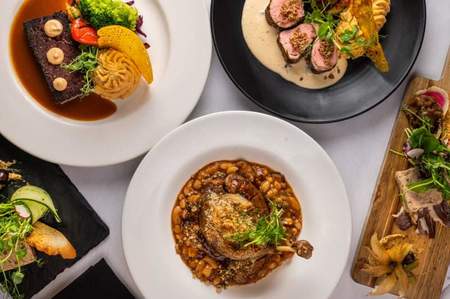
In addition to the regular menu displayed on large wheeled blackboards, which changes with the seasons, one can always order frozen dishes for takeout, offering meals distinct from the regular menu and complementing the dining room offerings. This product, even post the 2000-2001 pandemic, continues to enjoy success. They also offer various takeout and reheat dishes (soups, salads, charcuteries, sweetbreads, black pudding, pork tenderloin, for example).
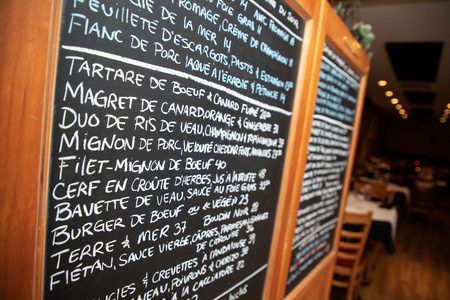
Indeed, La Girolle remains one of the rare "bring your own wine" (or beer) restaurants in Quebec City, a concept David Grenier assures will not change. This format is highly appreciated six evenings and three afternoons each week, from August to June. Its location outside tourist districts allows a month-long July vacation for the team of approximately 25 employees.
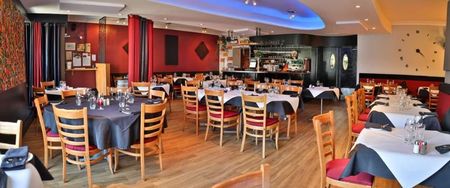
La Girolle can accommodate up to 140 guests in the evening, from Tuesday to Sunday, with 106 seats spread across two distinct sections. Reservations are recommended, especially from Friday to Sunday. Workers and residents of the neighborhood frequent it for lunch from Wednesday to Friday.
For history enthusiasts, the establishment Les Prés had been located here since 1990. La Girolle has been operating at this address since 2000.
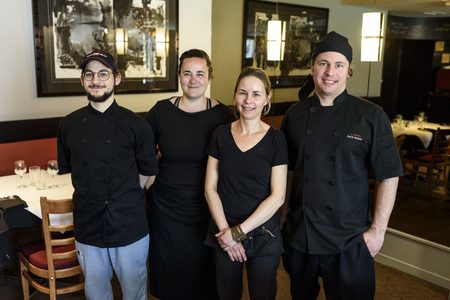
Restaurant La Girolle
lagirolle.ca
1384, Chemin Sainte-Foy
Québec, QC, G1S 2N6
(418) 527-4141
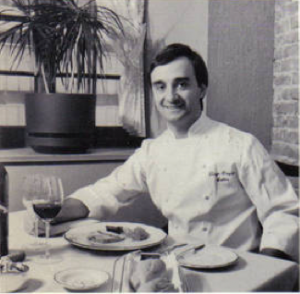
A native of Lyon in France, Serge Bruyère fell in love with the city of Québec from his very first visit in 1976. He immigrated to its province during the Montréal Olympic Games, working at the Queen Elizabeth Hotel before moving to Québec city. Prior to leaving his native country, he had undergone his training in the kitchens of l’Auberge du Tunnel in Auvergne with Paul Bocuse and the Troisgros brothers. He first worked at the Hilton before becoming executive chef at the Éperlan restaurant. One year later, he founded the Marie-Clarisse restaurant near the Breakneck Stairs (l’Escalier Casse-cou) with another partner. In 1980, he undertook a new adventure at the Maison Livernois on Saint-Jean Street, this time on his own: Serge Bruyère’s restaurant À La Table was created. He was among the very first chefs to work closely with local craftsmen in order to obtain high quality products for his menu.
Serge Bruyère died prematurely in 1994 at the age of 33. His heritage is considered enormous: he introduced an updated version of haute cuisine, laying the foundations of a gastronomy concerned with great quality and based on a relationship of proximity with his suppliers. Throughout the 14 years of existence of À La Table, Bruyère devoted time and energy in training dozens of competent chefs like Daniel Vézina, Jean Soulard and Marie-Chantale Lepage, who to this day remain inspired by his culinary philosophy.
His passion for gastronomy as well as his devotion to the recognition of the trade were immense. He knew how to transmit his enthusiasm and the importance of working with precision, and also to respect clients and producers. Bruyère is one of only two Québec chefs to be included in the Larousse gastronomique lexicon, and was the first to introduce new cuisine to the city.
He was a humble, sympathetic and respected chef. His passion for quality produce and his unfailing technique and hard work, along with the sharing of his knowledge were of utmost importance to him. The Fondation Serge Bruyère, which is dedicated to the encouragement of Québec’s new culinary talent, serves to perpetuate his legacy.
The Massimadi Festival, special edition, celebrates Black History Month from February 15 to 18, 2024, at the McCord Museum Stewart with the theme of Transcendence. This cinematic celebration presents a variety of films, including the opening documentary, Disruptor Conductor (2019), offering a captivating insight into the life of Afro-Canadian conductor Daniel Bartholomew-Poyser. Among the noteworthy artworks, Who I am Not (2023) by Tunde Skovran emotionally explores the intersex experience, while All the Colours of the World Are Between Black and White (2023) by Babatunde Apalolo addresses the challenges of LGBTQ+ relationships in a society where homosexuality remains taboo. RAIZES (2023) by Céline RUFFIN-BAYARDIN delves into the universe of the lesbian-trans-activist batucada Raízes Arrechas in Paris. Each screening will be followed by discussion circles or Q&A sessions, allowing direct exchanges between the audience and the artists. On February 17, seize the unique opportunity to witness the first performance of Afro-Canadian conductor Daniel Bartholomew-Poyser in Montreal, in collaboration with the Obiora Ensemble. This special edition promises a transcendent experience, celebrating the diversity and resilience of Black LGBTQ+ communities.
Today Capital Pride announced its inaugural Ice Parade, taking place during Winterlude as part of a winter celebration of Pride. The Ice Parade, Canada’s first-ever Pride parade on ice, kicks-off at 4 p.m. on the Rideau Canal Skateway at the Concord Rest Area on Sunday, February 11, 2024, ending at the Fifth Avenue Rest Area in The Glebe.
The ice-parade will feature music and a DJ set, local drag performers on skates, and Capital Pride’s 30-foot Progress Pride Flag carried by players from Ottawa Pride Hockey. Festival-goes, community members and allies are invited to meet at the start of the parade, at the Concord Rest Area on the Rideau Canal, in skates or on foot, or join in along the route.
“Capital Pride is committed to advocating for the 2SLGBTQIA+ community, as well as creating opportunities to celebrate our diversity. We’re lucky to be able to celebrate that diversity on the world’s longest skating rink!” says Callie Metler, Capital Pride Executive Director.
“Winterlude is no ordinary winter event; it’s an opportunity to celebrate Canada’s rich culture and diversity in so many different ways. Whether you’re a fan of the outdoors, shows, exhibitions or cultural discoveries, Winterlude features indoor and outdoor activities that offer something for everyone. Come join the celebration at the 46th Winterlude from February 2 to 19!” says Pascale St-Onge, Minister of Canadian Heritage.
Winter Pride activities take place February 5-11, including outdoor drag shows on Sparks Street, drag storytime and other family programming. This year’s Winter Pride is presented in partnership with Winterlude.
Capital Pride celebrates the rich and diverse 2SLGBTQIA+ community in the Capital Region. Mission is to create opportunities to advocate, educate and connect people through programming and events in partnership with our partner community groups, businesses, and sponsors.
Presented as part of the WILDSIDE Festival, award-winning drag comedienne Pearle Harbour presents Agit-Pop!, a hilarious and heartbreaking cabaret for the end times. Think Judy Garland at Carnegie, on acid.
Weaving her signature wit and demented storytelling through the headlines, Pearle takes on the world, from climate catastrophes, to nuclear anxiety, the lust for housing, the dark web, fake news and real history.
Accompanied by musical director Stella Conway, Agit-Pop! reimagines the number-one hits of David Bowie, Britney Spears, The Beach Boys, and more, as you've never heard them before.
By Gaëtan Vaudry
Running a chocolate shop involves a deep commitment to a fascinating world. This is exactly what chocolatier Véronique Émond has been doing since founding Choco Véro in 2017. A year later, she left her role as the head of food services at the Baie-Comeau detention center to dedicate herself entirely to her business.
In an interview with journalist Charlotte Paquet from the La Manic newspaper of Baie-Comeau in 2018, Véronique stated that "there is no price for living your passion." And that’s what she has been doing with her partner, investing at least 70 hours per week. Besides selling her products at her Place La Salle store and through her Facebook page, Véronique also offers her products in about a dozen convenience stores from Colombier to Port-Cartier.
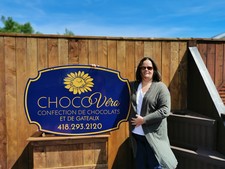
The Best Local Ingredients
Since October, the artist at Choco Véro has been working on her holiday products and, for a few days now, preparing her offerings for Valentine's Day, a pivotal period for chocolateries. This will be followed by Easter, Mother's Day, and Father's Day: "Our products are handmade with the finest local ingredients," the chocolatier proudly emphasizes. "We guarantee that you will savor the taste of your personalized treat with every bite."

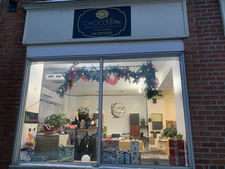
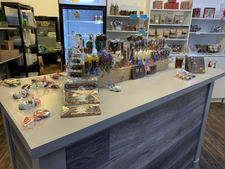
In our meeting, the businesswoman explained her deep involvement in fundraising campaigns. Numerous organizations seek her services for custom-made chocolates, which they then sell for fundraising purposes. "I love to get involved in these causes close to my heart," she specifies. "Choco Véro is also actively involved in the campaign for the Canadian Multiple Sclerosis Society, as well as cancer causes." Last November 28, Véronique proudly participated in GivingTuesday, where several businesses in Baie-Comeau donated their day's profits to United Way.
Choco Véro
8, Place La Salle
Baie-Comeau, Québec
418 293-2120
chocovero.com












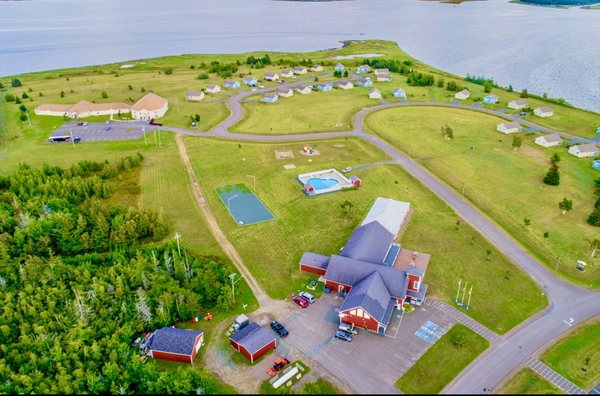
 Martin Albert is proud to have been part of this wonderful adventure for nearly 10 years. For him, the mission and vision of Villégiature Deux Rivières are part of his everyday life. Although the place has already become a staple for quality accommodation and stays in recent years, he aims to make it “the preferred destination in Atlantic Canada, where guests can capture unforgettable Acadian-flavored memories.”
Martin Albert is proud to have been part of this wonderful adventure for nearly 10 years. For him, the mission and vision of Villégiature Deux Rivières are part of his everyday life. Although the place has already become a staple for quality accommodation and stays in recent years, he aims to make it “the preferred destination in Atlantic Canada, where guests can capture unforgettable Acadian-flavored memories.”